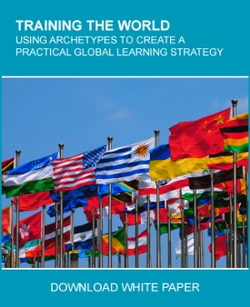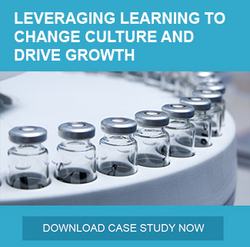by Dawn Francis, Ed.D.
In my previous entries, I defined transformative learning and discussed how companies can apply it. This entry will focus on examples of transformative learning in practice.
First, I’ll briefly review transformative learning in case you’ve just joined this series.
For learning to be transformative, it must provoke a shift in mindset. Acquiring knowledge, developing skills – these pursuits serve an important function in any training curriculum. However, if an organization wants to foster a change in culture, establish new ways of working, and grow its managers into leaders, then knowledge acquisition and skill development are only two components of the overall equation. What’s missing is the third and most crucial component—critical assessment of one’s own frame of reference.
Think about it…if our frame of reference or mindset is based upon our unexamined assumptions and expectations…and this mindset guides our behavior…we will continue to behave in the same way and come up with the same results. But if we challenge this mindset, call into question our assumptions, dialogue with others about the validity of our assumptions, shift our mindset, and act accordingly – well, we’ve just changed our behavior and came up with very different results. Real business value can be achieved through transformative learning.
So, here are some examples taken from an article entitled “Transformative Learning in Human Resource Development” (Fisher-Yoshida, Geller, and Wasserman, 2005).
Leadership Development: An international organization wanted to create a program to prepare leaders for rapid economic, social, and political changes. A relational leadership development program was developed, which incorporated psychological surveys (e.g., Myers-Briggs Type Indicator), measures of leadership (e.g., situational leadership survey), and 360 feedback assessments to provide managers with insight into themselves. Managers who reviewed the feedback and discussed it with their peers were prompted to critically examine their existing beliefs, attitudes, values, and behaviors, and revise them. The experience transformed these managers into leaders who were more mindful of others, empathetic, and conscious of the impact of their actions on business results.
Managing Conflict: An organization experiencing conflict in the workplace enrolled its employees in a conflict resolution workshop. Typically, conflict had been addressed through a problem-solving approach where the focus was on the issue. The strategy failed to consider the origin of the conflict or why it came to exist. Participants in the workshop used storytelling to convey information about the conflict to a fellow participant, while that individual listened and questioned the assumptions underpinning the conflict. The result is that the storyteller was able to see the conflict in a different light and regard others as different, but not as adversaries.
Besides assessment and storytelling, other methods of fostering transformative learning include simulations, coaching, critical incidents, role plays, and group projects.
Thank you for your interest in this series!


